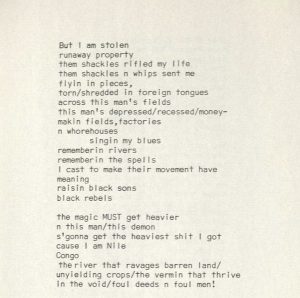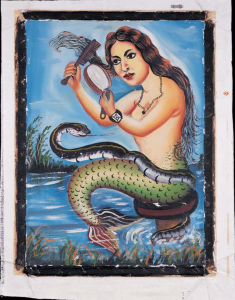In Thulani Nkabinde’s “I am Brown,” the speaker, “a child of the third world,” remembers and embodies a centuries-long history of slavery, resistance, and female empowerment (2). She exists both “in this world” as an “illegitimate seed / mishap of the honkies goodtimes” and yet she is “stolen / runaway property”: she exists both in the present and in the past alongside her enslaved ancestors; she is their modern reproduction (6-7, 54-55). In this poem, printed in Third World Women, the speaker explores her heritage, rejecting “the westerner” while embracing her “sister” (24, 41).

The final stanza of Thulani Nkabinde’s “I am Brown.”
The sea—powerful, touching many continents—represents the speaker’s origin and identity. From the start of this poem, the speaker remembers “the sea n my real home” and then embodies that sea, saying that “many rivers flow into my waters” (9, 14). Her origins are as numerous and diverse as the streams that flow into an ocean. She controls this water as she is “rememberin rivers/ rememberin the spells / I cast to make their movement have / meaning” (64-67). Her sister is also “murmurin chantings” as she “gives the rivers their flow” (39-40). Nkabinde likens the power of these women of color to magic—a magic that “the westerner… rich n ignorant” cannot understand because “he aint hip to magic” (24, 26, 28). The speaker’s origins and mystical power converge in her repeated declaration: “I am Nile / Congo / the greatest waters of the earth / the falls they call / Victoria” (49-53). In these lines, she refers to the white colonizers who christened a Zimbabwean waterfall Victoria Falls. Like this body of water, the speaker has been shaped by Africa and re-named by a white society. The speaker personifies the powerful waters of the ocean.

A painting of Mami Wata (“Mami Wata”).
In this personification, Nkabinde alludes to Mami Wata, an African water spirit. Usually embodied by a woman, Mami Wata (literally, “Mammy Water”) is fabled to live in the waters of the Atlantic Ocean, connecting the coasts of Africa and the Americas and luring voyagers with her beauty and power (“Mami Wata”). At once dangerous, sexual, and a nurturing mother, Mami Wata is the female embodiment of multiple transcontinental origins. The speaker in “I am Brown” is also a mother, “raisin black sons / black rebels,” and also a female sorcerer, “workin voodoo madness” (68-69, 30). She too comes from several places and a history as vast as the sea. Therefore, the speaker acts as a modern Mami Wata who stretches through time and space: through generations, across the continents of the globe.
“I am Brown” symbolizes the larger aims of Third World Women. The editors of this book note that Third World Women “is only a beginning”: published in 1972, it marks the official entrance of women of color into the Feminist Poetry Movement. The speaker in “I am Brown” embodies the mythical traditions of Africa as she grapples with her identity in the modern world. Similarly, the writers and artists featured in Third World Women nod to their diverse ancestors as they insert themselves into a growing movement of American women.
Sources:
“Mami Wata.” Smithsonian National Museum of African Art, https://africa.si.edu/exhibits/mamiwata/intro.html. Accessed 10 December 2019.
Nkabinde, Thulani. “I am Brown.” Third World Women. Third World Communications, 1972.
Third World Women. Third World Communications, 1972.
